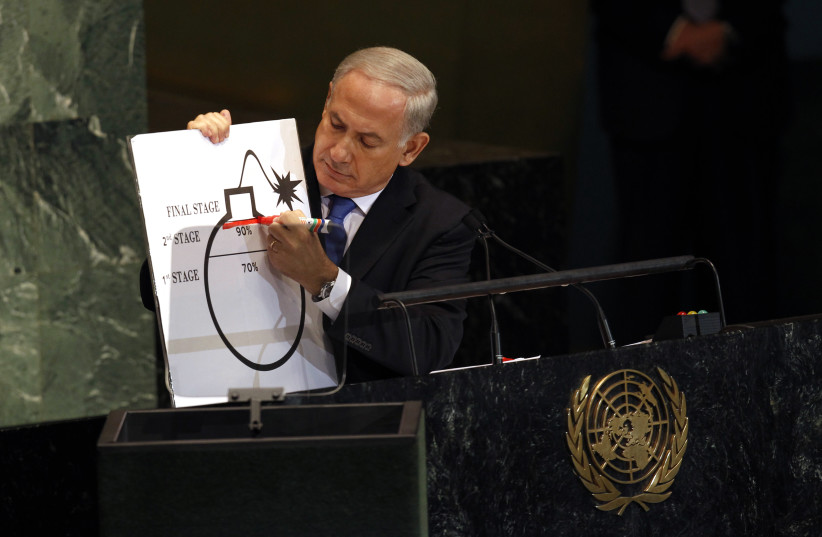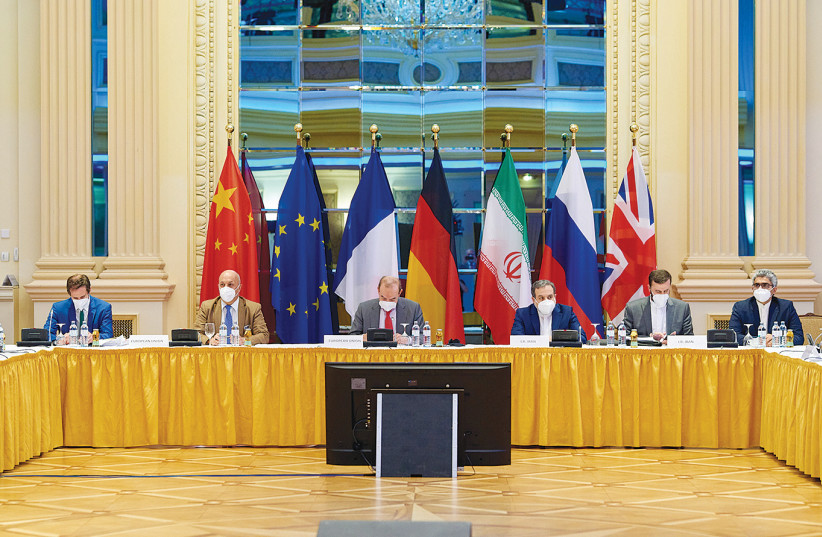Let’s say Khamenei gives the decisive order to weaponize Iran’s uranium. What does Isreal do?

The famous saying “beware what you wish for” may soon apply to Israel and the Iranian nuclear threat.
Although most signs show that there will still be a nuclear deal between the Islamic Republic and the world powers in not too long, the persistent delays and new element of instability introduced by US-Russian conflict over Ukraine has put the entire enterprise back in question.
At first glance, this would make Israel happy.
Both the former government of Benjamin Netanyahu and the current government of Prime Minister Naftali Bennett and Foreign Minister Yair Lapid have taken clear stances against the deal.
They have said that whatever short-term benefits in delaying the Iranian nuclear threat might be procured by the deal, the loss of leverage of financial sanctions and the likely complacency and false sense of security the deal will create make it a bad one.

But what will Bennett and Lapid do if they get their wish and there is no deal?
Iran already has enough enriched uranium, if enriched up to the 90% weaponized level, for four nuclear bombs.
Experts estimate that with the large quantities of 60% and 20% enriched uranium that Tehran already has, they could enrich enough uranium to the 90% weaponized level possibly in a matter of weeks, or a few weeks for each one.
If the deal falls through, the ayatollahs will have seen that while enriching up from 5% to 20% to 60% got the world’s attention, it will not have “delivered the goods” in terms of lifting sanctions (in fact, there will still probably be a deal soon precisely because the West is terrified of the 60% enrichment.)
Really their only next step to apply more pressure to the West would be to go to the 90% weaponized level.
So let’s say Iran Supreme Leader Ayatollah Ali Khamenei finally gives the decisive order to weaponize their uranium.
What does Israel do then?
Does it live with Khamenei on that nuclear threshold indefinitely, hoping that continued sanctions will eventually force him into a deal with fewer holes than the 2015 JCPOA deal?
How realistic is this when China and Russia are doing all they can to keep Iran’s economy humming, even if at lower levels?
If the Islamic Republic does not crack – as it did not already through four years of sanctions – will Jerusalem take action?
Since July 2020, the Mossad has reportedly covertly blown up all or part of three or more Iranian nuclear facilities and assassinated lead nuclear scientist Mohsen Fakhrizadeh.
Yet, the ayatollahs still found ways to get to enough enriched uranium for four nuclear bombs by virtue of a large number of facilities, redundancies and spread out uranium stock.
In theory, the IDF could initiate a large-scale preemptive air strike to try to further set back Iran’s nuclear program.
But there have been no signs from Bennett, Lapid or even Defense Minister Benny Gantz, that Israel would be ready to undertake such a massive and risky measure until Iran is much closer to firing a nuclear missile.
Experts estimate that even once Iran crosses the uranium weaponization threshold it may be six months to two years from mastering detonation, miniaturization of a nuclear warhead on a missile and delivery of the missile.
So there is every reason to expect that Israel would wait, certainly for at least six months and maybe even longer before taking any overt military action. There are also no guarantees that even a wider overt airstrike would buy Israel more than a couple of years before Iran’s scientists could get their program back to the same place.
This is not Iraq in 1981 or Syria in 2007 where the IDF hit a nuclear site once and the story ended because, at this point, Iran has homegrown knowledge and a homegrown industry.
Possibly, the world powers would refer Iran to the UN Security Council and possibly this could lead to pressuring China and Russia to fall in line with the sanctions regime.
But even that process would take time and how it would play out would be uncertain.
Either way, the Jewish state might need to live with Khamenei with 90% fully weaponized uranium for several months, unless the Mossad finds a way to blow up even more things faster than the Iranians can replace them.
This would be the scenario that Israel has said it wanted. The sanctions would remain and the world would continue to be alarmed by Iranian nuclear progress.
But it is unclear exactly how Jerusalem would neutralize Khamenei’s nuclear threat at that point and what costs might come along the way.
Content retrieved from: https://www.jpost.com/middle-east/iran-news/article-700851.